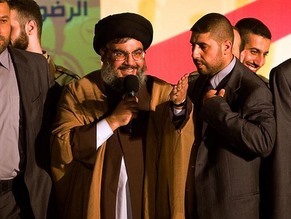|
World Jewish News

Photo by Paula Bronstein/Getty Images
|
Despite Lebanon unrest, tribunal expected to blame Hezbollah for Hariri murder
17.01.2011, Israel and the World The international tribunal investigating the assassination of former Lebanese Prime Minister Rafik Hariri is expected to file indictments on Monday against those it believes are responsible for the murder.
Lead prosecutor Daniel Bellemare will bring the indictments before Judge Daniel Fransen for a preliminary review. Fransen was appointed to the post by the International Court of Justice at The Hague.
The tribunal is expected to argue that Hezbollah agents, including some of the more senior figures in the Shi'ite Muslim organization, were involved in the 2005 assassination.
Fransen will likely review the documents over a period of six to 10 weeks and then decide on the legal steps to be taken.
Hezbollah leader Sheikh Hassan Nasrallah commented on the expected indictments during a televised address on the group's TV station, Al-Manar. He asserted that the accusations aim to undermine the "resistance" and that the United Nations tribunal is working under the auspices of the United States and Israel.
Nasrallah dedicated most of his address to the current political situation in Lebanon and the latest crisis following the Hezbollah ministers' resignation from the government coalition. He avoided making use of very threatening language and was careful not to hazard that Hezbollah will use force, but did say that the group will not allow anyone to harm the "resistance."
The Hezbollah leader also blamed Lebanese Prime Minister Saad Hariri, the son of the assassinated Hariri, for foiling the mediation efforts of Syria and Saudi Arabia.
The indictments are considered to be a historic event for Lebanon, considering the serious accusations expected to be directed against the country's most powerful group and militia. The tribunal's conclusions are expected to deal a severe blow to the group which, since 1992, has worked to present itself as a patriotic Lebanese organization.
The story began on February 14, 2005, with the assassination of Rafik Hariri in a car bombing in Beirut. The blast killed 22 others as well.
Initially the Lebanese suspected that Syria had been behind the attack, which led hundreds of thousands to take to the streets and demonstrate against the Syrian presence in the country. At the time, several senior security figures with ties to the neighbor to the east were held under arrest.
The man responsible for Syrian intelligence activities in Lebanon for many years, Ghazi Kanaan, was found dead in his office several months later; the circumstances of his death remain obscure to this day.
An international tribunal was appointed to investigate Rafik Hariri's assassination, and soon after rumors began that individuals affiliated with Hezbollah would be indicted for the murder. Nasrallah gave a speech warning that the evidence on which the tribunal was basing its accusations were forged and blamed Israel for the killing.
Since then, the Hezbollah leader has been trying to prevent the publication of the indictments in any way possible. The group pressured Saad Hariri in an effort to gain his support to end the work of the tribunal - 51 percent of whose budget is being contributed by the Lebanese government. The group threatened that if the indictments were made public, Hezbollah would alter the status quo in the country.
The threats led to Saudi-Syrian mediation efforts between the 14 March camp, headed by the younger Hariri, and the 8 March camp, headed by Hezbollah. But those efforts failed.
Hezbollah response unclear
The indictments will be presented at the same time that a new prime minister is appointed in Lebanon. Hariri's supporters maintain that Lebanese President Michel Suleiman will assign him the task of forming a new government, since he has a majority in parliament.
However, the stance of Druze leader Walid Jumblatt on the matter remains unclear. Jumblatt said on Sunday that he will support Hariri if he accepts the compromise proposal put forward by Syria and Saudi Arabia.
If Jumblatt decides not to support Hariri, the new government will be formed by one of the pro-Syrian parties.
At this time it is also unclear how Hezbollah will respond to the indictments which are expected to point directly to Mustafa Badr al-Din, son-in-law of the former Hezbollah strongman Imad Mughniyeh, who likely also had a role in the Hariri assassination.
Nasrallah said on Sunday that he does not close the door to the possibility of dialogue and that only after two or three days, once the indictments are evaluated, will he decide what to do.
"We will not allow our honor to be harmed. We will not agree to be stained with the blood of the martyr Rafik Hariri," he said.
Nasrallah reiterated that Israel was to blame for the murder. He added that the Hezbollah candidate for the post of prime minister will be presented on Tuesday, during discussions with Suleiman.
Haaretz.com
|
|
